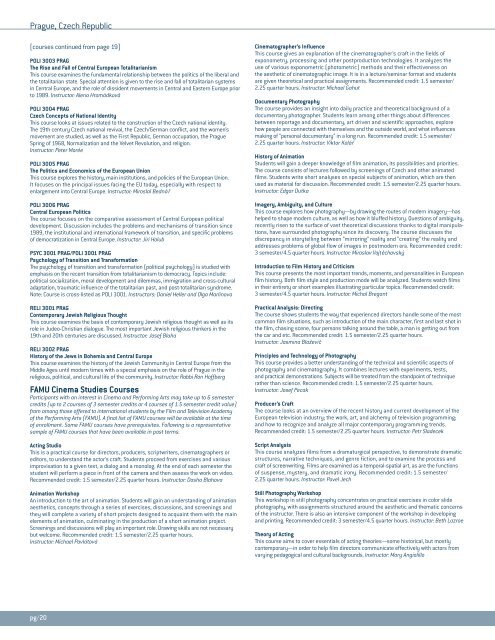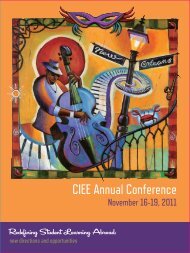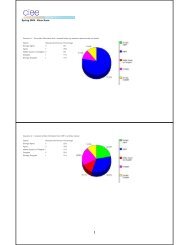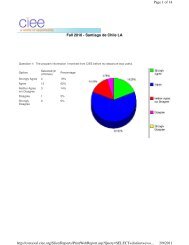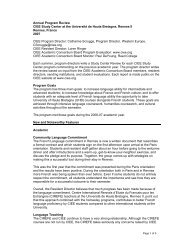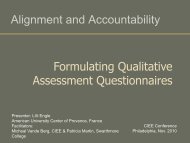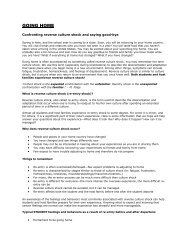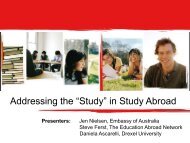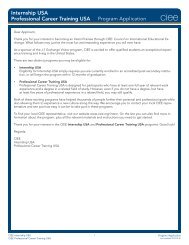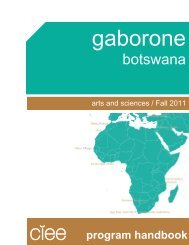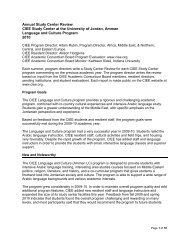studyeurope - Council on International Educational Exchange
studyeurope - Council on International Educational Exchange
studyeurope - Council on International Educational Exchange
- No tags were found...
Create successful ePaper yourself
Turn your PDF publications into a flip-book with our unique Google optimized e-Paper software.
Prague, Czech Republic[courses c<strong>on</strong>tinued from page 19]POLI 3003 PRAGThe Rise and Fall of Central European TotalitarianismThis course examines the fundamental relati<strong>on</strong>ship between the politics of the liberal andthe totalitarian state. Special attenti<strong>on</strong> is given to the rise and fall of totalitarian systemsin Central Europe, and the role of dissident movements in Central and Eastern Europe priorto 1989. Instructor: Alena HromádkováPOLI 3004 PRAGCzech C<strong>on</strong>cepts of Nati<strong>on</strong>al IdentityThis course looks at issues related to the c<strong>on</strong>structi<strong>on</strong> of the Czech nati<strong>on</strong>al identity.The 19th century Czech nati<strong>on</strong>al revival, the Czech/German c<strong>on</strong>flict, and the women’smovement are studied, as well as the First Republic, German occupati<strong>on</strong>, the PragueSpring of 1968, Normalizati<strong>on</strong> and the Velvet Revoluti<strong>on</strong>, and religi<strong>on</strong>.Instructor: Peter MoréePOLI 3005 PRAGThe Politics and Ec<strong>on</strong>omics of the European Uni<strong>on</strong>This course explores the history, main instituti<strong>on</strong>s, and policies of the European Uni<strong>on</strong>.It focuses <strong>on</strong> the principal issues facing the EU today, especially with respect toenlargement into Central Europe. Instructor: Miroslal Bedná řPOLI 3006 PRAGCentral European PoliticsThe course focuses <strong>on</strong> the comparative assessment of Central European politicaldevelopment. Discussi<strong>on</strong> includes the problems and mechanisms of transiti<strong>on</strong> since1989, the instituti<strong>on</strong>al and internati<strong>on</strong>al framework of transiti<strong>on</strong>, and specific problemsof democratizati<strong>on</strong> in Central Europe. Instructor: Jiri HolubPSYC 3001 PRAG/POLI 3001 PRAGPsychology of Transiti<strong>on</strong> and Transformati<strong>on</strong>The psychology of transiti<strong>on</strong> and transformati<strong>on</strong> (political psychology) is studied withemphasis <strong>on</strong> the recent transiti<strong>on</strong> from totalitarianism to democracy. Topics include:political socializati<strong>on</strong>, moral development and dilemmas, immigrati<strong>on</strong> and cross-culturaladaptati<strong>on</strong>, traumatic influence of the totalitarian past, and post-totalitarian syndrome.Note: Course is cross-listed as POLI 3001. Instructors: Daniel Heller and Olga MarlinovaRELI 3001 PRAGC<strong>on</strong>temporary Jewish Religious ThoughtThis course examines the basis of c<strong>on</strong>temporary Jewish religious thought as well as itsrole in Judeo-Christian dialogue. The most important Jewish religious thinkers in the19th and 20th centuries are discussed. Instructor: Josef BlahaRELI 3002 PRAGHistory of the Jews in Bohemia and Central EuropeThis course examines the history of the Jewish Community in Central Europe from theMiddle Ages until modern times with a special emphasis <strong>on</strong> the role of Prague in thereligious, political, and cultural life of the community. Instructor: Rabbi R<strong>on</strong> HoffbergFAMU Cinema Studies CoursesParticipants with an interest in Cinema and Performing Arts may take up to 6 semestercredits (up to 2 courses of 3 semester credits or 4 courses of 1.5 semester credit value)from am<strong>on</strong>g those offered to internati<strong>on</strong>al students by the Film and Televisi<strong>on</strong> Academyof the Performing Arts (FAMU). A final list of FAMU courses will be available at the timeof enrollment. Some FAMU courses have prerequisites. Following is a representativesample of FAMU courses that have been available in past terms.Acting StudioThis is a practical course for directors, producers, scriptwriters, cinematographers oreditors, to understand the actor’s craft. Students proceed from exercises and variousimprovisati<strong>on</strong> to a given text, a dialog and a m<strong>on</strong>olog. At the end of each semester thestudent will perform a piece in fr<strong>on</strong>t of the camera and then assess the work <strong>on</strong> video.Recommended credit: 1.5 semester/2.25 quarter hours. Instructor: Dasha BlahovaAnimati<strong>on</strong> WorkshopAn introducti<strong>on</strong> to the art of animati<strong>on</strong>. Students will gain an understanding of animati<strong>on</strong>aesthetics, c<strong>on</strong>cepts through a series of exercises, discussi<strong>on</strong>s, and screenings andthey will complete a variety of short projects designed to acquaint them with the mainelements of animati<strong>on</strong>, culminating in the producti<strong>on</strong> of a short animati<strong>on</strong> project.Screenings and discussi<strong>on</strong>s will play an important role. Drawing skills are not necessarybut welcome. Recommended credit: 1.5 semester/2.25 quarter hours.Instructor: Michael PavlátováCinematographer’s InfluenceThis course gives an explanati<strong>on</strong> of the cinematographer’s craft in the fields ofexp<strong>on</strong>ometry, processing and other postproducti<strong>on</strong> technologies. It analyzes theuse of various exp<strong>on</strong>ometric (photometric) methods and their effectiveness <strong>on</strong>the aesthetic of cinematographic image. It is in a lecture/seminar format and studentsare given theoretical and practical assignments. Recommended credit: 1.5 semester/2.25 quarter hours. Instructor: Michael GahutDocumentary PhotographyThe course provides an insight into daily practice and theoretical background of adocumentary photographer. Students learn am<strong>on</strong>g other things about differencesbetween reportage and documentary, art driven and scientific approaches, explorehow people are c<strong>on</strong>nected with themselves and the outside world, and what influencesmaking of “pers<strong>on</strong>al documentary“ in a l<strong>on</strong>g run. Recommended credit: 1.5 semester/2.25 quarter hours. Instructor: Viktor KolářHistory of Animati<strong>on</strong>Students will gain a deeper knowledge of film animati<strong>on</strong>, its possibilities and priorities.The course c<strong>on</strong>sists of lectures followed by screenings of Czech and other animatedfilms. Students write short analyses <strong>on</strong> special subjects of animati<strong>on</strong>, which are thenused as material for discussi<strong>on</strong>. Recommended credit: 1.5 semester/2.25 quarter hours.Instructor: Edgar DutkaImagery, Ambiguity, and CultureThis course explores how photography—by drawing the routes of modern imagery—hashelped to shape modern culture, as well as how it bluffed history. Questi<strong>on</strong>s of ambiguity,recently risen to the surface of vast theoretical discussi<strong>on</strong>s thanks to digital manipulati<strong>on</strong>s,have surrounded photography since its discovery. The course discusses thediscrepancy in storytelling between “mirroring” reality and “creating” the reality andaddresses problems of global flow of images in postmodern era. Recommended credit:3 semester/4.5 quarter hours. Instructor: Miroslav VojtěchovskýIntroducti<strong>on</strong> to Film History and CriticismThis course presents the most important trends, moments, and pers<strong>on</strong>alities in Europeanfilm history. Both film style and producti<strong>on</strong> mode will be analyzed. Students watch filmsin their entirety or short examples illustrating particular topics. Recommended credit:3 semester/4.5 quarter hours. Instructor: Michal BregantPractical Analysis: DirectingThe course shows students the way that experienced directors handle some of the mostcomm<strong>on</strong> film situati<strong>on</strong>s, such as introducti<strong>on</strong> of the main character, first and last shot inthe film, chasing scene, four pers<strong>on</strong>s talking around the table, a man is getting out fromthe car and etc. Recommended credit: 1.5 semester/2.25 quarter hours.Instructor: Jasmina BlaževičPrinciples and Technology of PhotographyThis course provides a better understanding of the technical and scientific aspects ofphotography and cinematography. It combines lectures with experiments, tests,and practical dem<strong>on</strong>strati<strong>on</strong>s. Subjects will be treated from the standpoint of techniquerather than science. Recommended credit: 1.5 semester/2.25 quarter hours.Instructor: Josef PecakProducer’s CraftThe course looks at an overview of the recent history and current development of theEuropean televisi<strong>on</strong> industry; the work, art, and alchemy of televisi<strong>on</strong> programming;and how to recognize and analyze all major c<strong>on</strong>temporary programming trends.Recommended credit: 1.5 semester/2.25 quarter hours. Instructor: Petr SladecekScript AnalysisThis course analyzes films from a dramaturgical perspective, to dem<strong>on</strong>strate dramaticstructures, narrative techniques, and genre ficti<strong>on</strong>, and to examine the process andcraft of screenwriting. Films are examined as a temporal-spatial art, as are the functi<strong>on</strong>sof suspense, mystery, and dramatic ir<strong>on</strong>y. Recommended credit: 1.5 semester/2.25 quarter hours. Instructor: Pavel JechStill Photography WorkshopThis workshop in still photography c<strong>on</strong>centrates <strong>on</strong> practical exercises in color slidephotography, with assignments structured around the aesthetic and thematic c<strong>on</strong>cernsof the instructor. There is also an intensive comp<strong>on</strong>ent of the workshop in developingand printing. Recommended credit: 3 semester/4.5 quarter hours. Instructor: Beth LazroeTheory of ActingThis course aims to cover essentials of acting theories—some historical, but mostlyc<strong>on</strong>temporary—in order to help film directors communicate effectively with actors fromvarying pedagogical and cultural backgrounds. Instructor: Mary Angiolillopg/20


